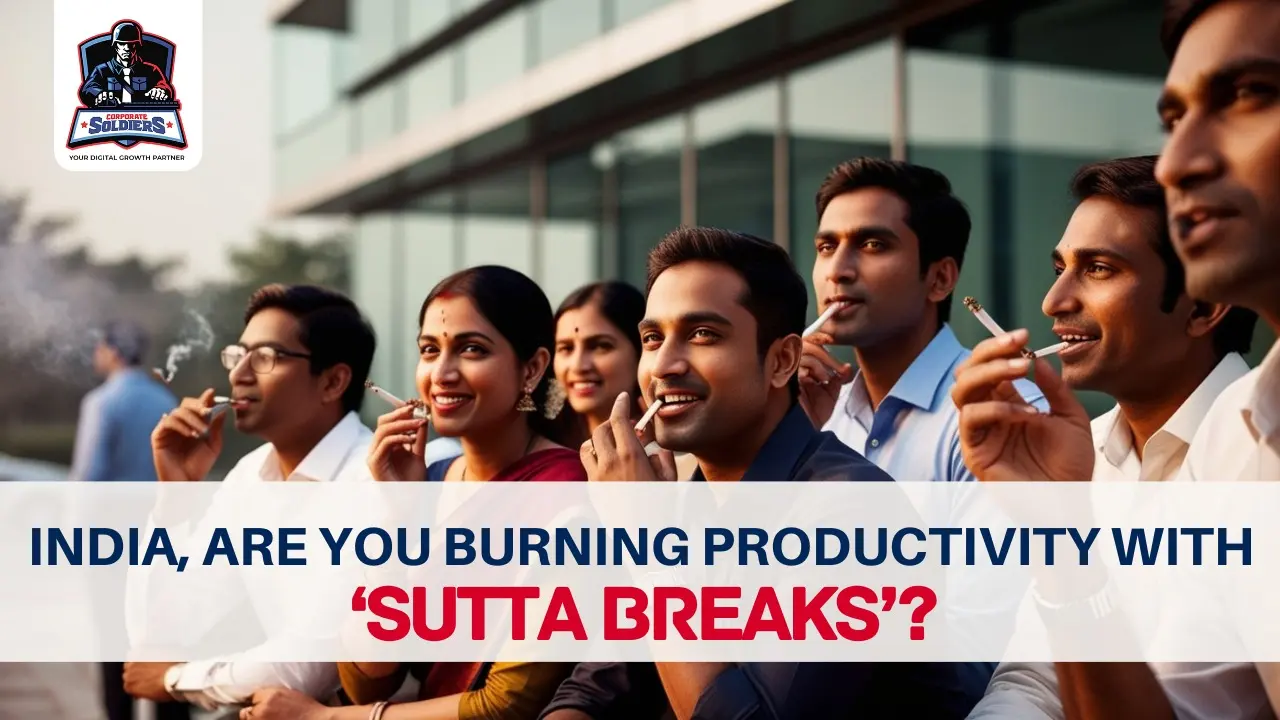Wait, are you taking a momentary ‘Sutta Break’ already? You must read this then! It’s been a couple of days since we celebrated the World Cancer Day, also a global debate has ignited and yet you are inhaling that puff without a care in the world. No, we aren’t berating you or giving you a lecture. But what if you could convert these momentary breaks into rewarding cash or a few extra paid days while you are on a family vacation? Of course, for this to happen, you must not take these short ‘Sutta Breaks’.
We are talking about the Japanese firm Piala Inc. that clinched the headlines in the global market and ignited a global debate by granting non-smokers 6 extra paid leave days annually to offset the time lost on colleagues’ smoke breaks. Surprised or shocked? Well, this is an actual scenario.
This policy highlighted the tension between workplace fairness, productivity, and lastly, cultural norms. This debate is particularly relevant in countries like India, where ‘Sutta Breaks’ are deeply ingrained and inseparable in corporate.
Corporate Soldiers always bring you the very best of corporate news, let’s see how smoking breaks impact your work productivity and how innovative solutions are emerging worldwide to cope with such things!
First, Let’s Look at The Initiative By Piala Inc. (Japan)!
What Piala Inc. observed in their workforce, happens quite frequently in Indian corporations too. But Piala Inc. got a little creative in their action. In a bold move, (that’s still making waves years after its implementation) Japanese marketing firm Piala Inc. introduced a policy to tackle the age-old issue of smoke breaks in a way that created ripples. The policy was celebrated by non-smokers and made smokers reconsider their smoking habits, and even some successfully quit smoking.
But how closely Piala Inc. observed this trend of their smoker employees, travelling to the 29th floor of a Tokyo skyscraper to take a whiff of smoke? Every time they needed a cigarette, it was a 15-minute round trip to the basement and back. Those smoke breaks added up, and non-smoking colleagues started to feel the burn of inequity as they didn’t take such momentary breaks. Also, non-smokers argued this created workload disparities.
How Did Piala Inc.’s Tackle The Situation?
As soon as they observed the trend, they brainstormed the solutions and reached to introduce a policy as a solution. What was that genius idea? They would grant non-smokers an extra six days of paid vacation annually in a fair way. A policy that not only addressed fairness concerns but also gently nudged smokers towards healthier choices, even to quit such hazardous habit of smoking.
CEO Takao Asuka’s innovative solution was so clear and also unusual, to incentivize health rather than penalize the habits. How innovative this thought was? And what was the result of such a policy? Employees at Piala Inc. not only embraced the change but also some smokers even decided to quit to cash in on the extra time off.
Global Responses:
This innovative approach to a positive and healthier workplace didn’t just make headlines, but soon it sparked a global conversation about how companies can creatively address health, productivity, and employee satisfaction all at once, just like Piala Inc. did it.
Japan:
| Company | Policy Type | Quit Rate | Result | Cost-effectiveness |
| Piala Inc. | 6 extra paid leave days | Nearly 25% smokers decided to quit smoking | Awareness about such smoking breaks | Low direct cost |
United Kingdom:
| Company | Policy Type | Quit Rate | Result | Cost-effectiveness |
| Swindon Company | 4 extra days for holidays | Not measured | Awareness about productivity loss | Minimal financial investment |
United States:
| Company | Policy Type | Quit Rate | Result | Cost-effectiveness |
|---|---|---|---|---|
| CVS Caremark Trial | Encashment $800-1940 | 9.4-16% within 6 months | Increased cessation attempts | $3200-6500 per life-year saved |
| GE Program | Cash incentive of $750 | Success rate up to 15% | Tripled quit rates | High ROI on healthcare cost |
Netherlands:
| Company | Policy Type | Quit Rate | Result | Cost-effectiveness |
| Dutch Study | € 350 along with group counselling | 22% within 12 months | Increased long-term abstinence from smoking | Long-term health benefits |
How India Considers ‘Sutta Breaks’As a Social Ritual?
Non-smoker or smoker, doesn’t matter, ‘Sutta Break’ is like a cult forming. In Indian workplace culture, these short breaks emerge as a curious phenomenon that transcends mere nicotine consumption. It becomes the social ritual to join in the conversation just like a common phrase, ‘Chai par Charcha’ meaning ‘Conversations over tea’. These smoke breaks, colloquially known as ‘Sutta time,’ have become an integral part of Indian corporate life, creating an intricate social ecosystem that defies simple categorization.
Just imagine a bustling IT park in Bangalore or a corporate tower in Mumbai, or any office in Gurugram, you can easily find small clusters of employees gather from time to time. In designated smoking zones or terraces, they blend their conversations around work gossip, creative brainstorming, stress relief and several other things.
Is This Affecting Productivity?
Unlike their Western counterparts, these breaks often attract non-smokers as well. Why? Because it becomes a social norm, otherwise you might feel left out or experience FOMO. Gossips serve as a curious concern to be involved with and get to know the tea. Drawn by the allure of unfiltered conversation and impromptu networking, even non-smokers too, include themselves in these ‘Sutta Breaks’. It’s not uncommon to see a junior developer sharing a lighter moment with a senior manager, and their hierarchical differences momentarily dissolve in a cloud of smoke.
However, this cultural quirk often kills productivity and of course health as well. These frequent breaks also raise concerns about fairness and responsibility as a professional. Under the curtain of ‘I can’t function without a smoke’, the minutes to hours go to waste in smoke as well.
Let’s see how these momentary ‘Sutta Breaks’ impact productivity.
| Context | India | Global | Our Study Source |
| Break Duration (Average) | 7-11 minutes | 7.2 minutes | Nicokick (2024) People Matters (2019), Economic Times (2010) |
| Breaks per day | 4-5 | 4.6 | Nicokick (2024), ResearchGate (2014), PMC (2004) |
| Daily Time Lost | 28-55 minutes | 33.12 | Based on calculations |
| Time Lost Annually | 143-238 hours | 144 hours | Based on calculations |
| Direct Productivity Loss | ₹1.77 lakh crores | NA | WHO (2021) |
| Tobacco Use Prevalence | 28.6% (4% cigarettes | 20% (Japan) | Piala Inc. Case Study, GATS-2 (2016-2017) |
India, Let’s Stop That ‘Sutta Na Mila’ Anthem!
India, it’s time we stop humming our ‘Sutta Na Mila’ anthem and we hope our corporate sector can encourage the same thing by introducing similar policies. Think about it, how it will change the whole scenario for you as well as for the company and also for the nation.
Can India Implement Such Initiatives Too?
As companies grapple with balancing tradition and modern workplace norms around the globe, innovative solutions are emerging. But now questions and curiosity are being raised in India as well. Can we implement such initiatives in our corporate culture too? Some firms are experimenting with ‘Chai Breaks’ or short wellness sessions, attempting to capture the essence of ‘Sutta Time’ without the health risks.
Current Trends & Their Impact:
In India, the workplace smoking culture blends nicotine use along with social bonding that often becomes ‘breaking the ice session’.
- 28.6% of adults use tobacco (mostly chewable forms; 4% smoke cigarettes).
- But non-smokers frequently often join breaks for camaraderie, blurring equity concerns.
- Labour laws cap on work hours at 9/day with 1-hour mandated breaks (Factories Act 1948). But these breaks extend beyond this 1 hour of lunch.
- According to studies and surveys smokers lose 143–238 hours/year to breaks.
- Thus, India loses ₹1.77 lakh crore annually in productivity.
What Can Be The Initiatives?
- Incentivization just like other countries can encourage the employees.
- Rewards for non-smokers can make the mark.
- New policies around such initiatives.
- In the Indian context, socialization has become a cultural norm. Replace smoke breaks with 10-minute ‘refresh breaks’ for all employees to socialize, stretch, or meditate, reducing resentment over smoke breaks.
- These refresh breaks can be taken to generate new creative ideas.
- We can introduce wellness credits that allow membership to local gyms or health clubs.
- Raise health awareness and campaigns to quit smoking.
- Replicate Tata Memorial Hospital’s model (40% quit rate) with free nicotine patches and counselling.
Piala Inc. in Japan, the innovative approaches in the UK, incentivization schemes in the U.S., and Netherlands, these success stories around the globe can be an ideal mark for India. But this is just the beginning of the conversation, we must start taking such boosting initiatives. From flexible break policies to holistic wellness programs, the solutions we’ve discussed are just the tip of the iceberg.
Corporate Soldiers always brings you the best of the Corporate news from all around the globe. We are keeping a hawk eye on this space and keep bringing interesting stories for you! Follow Corporate Soldiers for more!
Sayonara!










